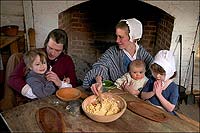Page content
Surviving the 17th Century

European immigrants to early Virginia displaced American Indians, increased intertribal warfare, and caused disease, all of which undermined tribal families. It was not one sided. In ways it was no better for Europeans and Africans. With them, fevers and intestinal diseases killed young and old alike. For the Africans who survived the Middle Passage from Africa, harsh working conditions claimed more lives. For the Europeans before 1640, colonists had an even chance of dying within one year, a quarter of all children did not make it to their first birthday, and half of all marriages ended in the death of one partner before the seventh anniversary.
The Virginia Colony had a large number of orphans, half-siblings, stepchildren, and foster parents in white families.
By the end of the 17th century, conditions improved for Virginia-born black and white families. Life expectancy rose, and the white population began to replace itself. Whites married earlier, lived longer, and had larger numbers of surviving children.
Virginia law, however, further defined slavery and shaped black families. The status of the mother, free or slave, determined the status of her children. Interracial marriage was restricted, as were the rights of free mulatto children.
Content excerpted from the Colonial Williamsburg Foundation’s publication “Becoming Americans”.
